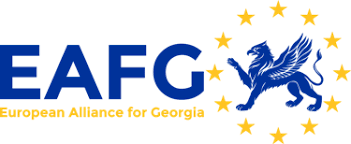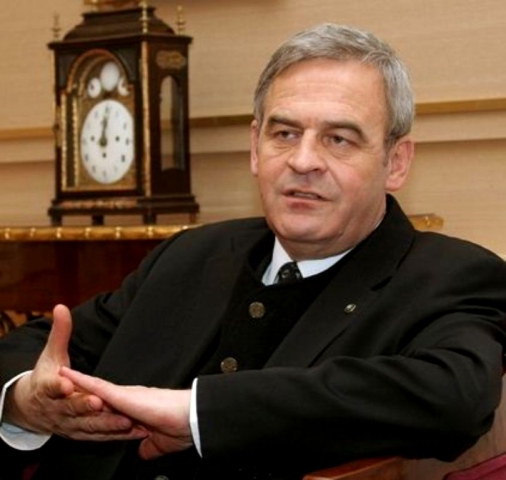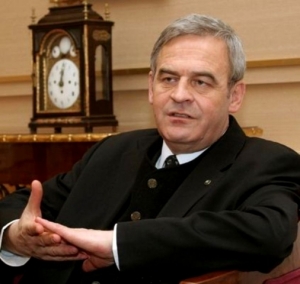What Does the EU Preach? – The MEP Bishop Explains All
Exclusive interview by Vazha Tavberidze
Being both a bishop and a Member of the European Parliament (MEP) is not a combination you see every day. Add “revolutionary” to that mix and it becomes even more bewildering – yet this is exactly what Hungarian MEP Laszlo Tokes is. Since the place of religion in the EU is one of the more intriguing ones for Georgian people, themselves (in majority) being a devout and church-going people, we asked MEP Tokes to share with us his insights on the matter in an exclusive interview for our “Messages from Brussels” series.
How does a man go from being a bishop to becoming member of the European Parliament?
In my reformed Hungarian church in Romania, it is very natural that churches have an impact on the social lives of their believers, in fact, it is a long-standing tradition with us. The Church is always involved in the everyday and political lives of its people because this is the role it has had to fill for centuries. My Protestant church, for example, was a champion of religious freedom and we had to speak out, to give voice to the interests of our people in the times of the Habsburg Empire and later in the time of atheist communism: we were the only advocates of our people and we were the hidden opposition of the Communist atheist regime; we were the shepherds of our parishes and communities.
Brussels preaches secularism. In such a world, what role does the Church have in politics?
In this regard, the Eastern Central European region is totally different from the secularized western parts of Europe because we have this tradition. Another example is the Polish Roman Catholic Church which has always had an important role in the life of Poland, including during the resistance in the time of John Paul II and throughout the regime change. This tradition is very much alive in Eastern Europe still.
Georgia is also an Eastern European country and is a country where the Church enjoys tremendous support and trust. Should Georgia become more secular to fit in with the European way?
I sympathize with Georgia because the Georgian Orthodox Church has not lost its role in the life of society, and our model of the role of the Church is very close to that of Georgia. I know and am delighted that the Georgian Orthodox Church is the most trusted institution in the country, so it is in the case of the Orthodox Church in Romania. Churches that come from Eastern and Central Europe can have an added value in the European Union and European integration process; we are all full supporters of the accession into the EU and share the values of original European standards, for example the culture of love and the culture of tolerance. More secular values like the culture of tolerance or human rights are very important in our churches and we were the pioneers of representing these values even before freeing ourselves from communism; well before joining the EU, as a matter of fact.
What is the main difference between the Western and Eastern tradition in how the Church works?
I believe it was divine providence that in our oppressed situation, the resistance of churches and the faith of the Christian people had the result of opposing the oppression and Soviet occupation, and the nationalist communist oppression of Romanian majority rule in our case, and it brought up in our conscience and spirits the need to become conscious supporters of those values we enjoy in the European Union. The Western countries were lucky as they did not have to face such challenges and such brutal pressure, and they became more distanced and secular with time. We had to face the atheism, but they had to get used to secularism, which is in our vision as bad as atheism; they benevolently left God and left the values of Christianity; we were forced to do so but we resisted these pressures and the dictate of the regime.
Some Eurosceptics in Georgia say that moving towards the EU means that the Church’s influence will be weakened and undermined. What would you say to such thinkers?
I already mentioned the added value by which we are enriching the EU. In my view, to be one in Christ is very similar and parallel to being one in the EU in terms of the spiritual dimension of it. I am convinced that the Christian faith is vitally important for the European Union. Sometimes the policies in economics, trade or in military issues divide us, but common values like our faith unite us.
But should it be religion or the values in and of themselves that unite people?
In my opinion, it must be so, as far as we are Christians and the values of Europe are rooted in Christianity: even if there is precedent in Jewish and other traditions, we are rooted in Christianity and it is obvious we think and believe in a Christian way. One of the oldest churches in the world is that of Georgia. How could Georgia join as an ally if Europe was not a Christian cultural and religious entity? It is clear that Georgia is communicating in these frameworks and that it has the feeling of being European through its Christian identity, just as [Romania] did when we joined [the EU] 10 years ago.
It has been seen that the Church can also play a negative role in politics, such as in the case of the Russian Church. What’s your take on that?
We have been very critical towards the Romanian and the Russian Orthodox churches in the past due to their obligated support of the communist regime. We Protestants were in opposition of the regime, yet the Romanian Orthodox Church was the ally of Nicolae Ceausescu, the Romanian dictator. I’m not fully clear on the situation in the Soviet republics, but as I know the Georgian Church had to suffer oppression and restrictions. Out of resistance to this situation, they had the merit to embrace their people, to keep the faith alive in the people and that led, in my opinion, to the fall of communism after a long fight against dictatorship.
There’s an ongoing debate as to whether the Georgian Orthodox Church should receive state funding and if it does, that a monitoring mechanism should be required. What do you think?
Yes, if the Church is fulfilling various functions, be they social, spiritual, educational or in charity work; functions worthy of praise and state financial support from taxpayers’ money.
But every taxpayer’s earnings goes in part to the State contribution to the Church. Non-believers ask why, and demand Church spending be monitored
It’s not only the Georgian Church; the Armenian Apostolic Church also has the benefit of a slice of the Georgian budget. I think in proportion, to a correct degree, all churches can be supported according to their contribution to society and to the common good of a society.
And the monitoring issue?
It is absolutely vital. In a democratic society, you cannot imagine that the activities or expenditures of the Church are not monitored; everybody has to be transparent in their work and there is nothing to be hidden and no shame in expanding, in spending the funds and money coming from the state budget.
The material was prepared in the scope of the “Messages from Brussels” series, a project of the European Alliance for Georgia, a Brussels-based NGO aiming to bring more Georgia into Europe.













